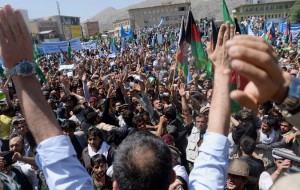UNITED NATIONS — Set to the backdrop of continuing violence, growing narcotics production, and fear about the future following the pullout of international forces, the recent round of Afghanistan’s presidential elections have become all the more crucial to produce a climate of needed stability in a land which knows only chaos.
Moreover, given the ongoing political/security meltdown in Iraq, a safe transition in Afghanistan becomes all the more critical for the West.
Reflecting on the fractious outcome of the election to replace outgoing president Hamid Karzai, the UN’s Jan Kubis, Special Representative for Afghanistan told the Security Council, “A timely political transition with a stable unifying outcome is the wish of the Afghan people and the necessary foundation to progress on Afghanistan’s political, security and development challenges.”

Yet Mr. Kubis warned that the country’s politicians “hold a paramount responsibility to manage this situation. “ He added, “As with elections anywhere in the world, there can ultimately be only one winner. The need now is for statesmanship not brinksmanship.”
Afghan Ambassador Zahir Tanin stressed, “This is a pivotal moment for Afghanistan. The democratic transition is the cornerstone of the Afghan-led and Afghan-owned progression to peace, stability, and prosperity.”
Significantly the Afghan delegate emphasized that his country would “prioritize a constructive relationship with out international partners, starting by signing a Bilateral Security Arrangement with the United States.”
Such a security pact, is critical in the transition especially in light of the Baghdad government not having signed such an agreement with Washington. U.S. forces will leave the South Asian country by the end of 2014.
Yet even assuming a fragile political settlement among Afghan factions, the road ahead faces the roadblocks of entrenched violence, poverty , and flourishing illegal narcotics production. The UN World Drug Reports lists Afghanistan as one of the foremost countries for opiates and cannabis resin. Amb. Peter Wilson of the United Kingdom warned, “the challenge posed by drugs, in Afghanistan and the wider region, were serious and complex.”
Russia’s delegate Vitaly Churkin was more blunt, “ Afghanistan was turning into a global hub for opium production. In that regard the future government should make counter narcotics efforts a priority.”
The Security Council issued a special statement on both the security and drug situation decrying, “The ongoing violent and terrorist activities by the Taliban, Al-Qaida and other violent extremist groups, illegal armed groups, criminals and those involved in the production, trafficking or trade of illicit drugs, and the strong links between terrorism and illicit drugs.”
Development aid remains crucial after decades of war and disruption. Rebuilding efforts have been a particular focus of countries like Japan who in the words of Amb. Motohide Yoshikawa, “Since 2001, we have contributed a total of $5.4 billion to Afghanistan for its development efforts. Japan is the second largest donor after the United States.” The Tokyo government has promised an additional $3 billion in aid starting in 2012.
Canada too has been a major donor with an aid package of $330 million for the Afghan security forces starting in 2015. All such foreign assistance agreements are tied to accountability and transparency norms by the Afghan side which has been notoriously corrupt.
There’s another view put forth by India, whose Amb. Bhagwant Singh Bishnoi stated, “India does not have an ‘Exit Strategy’ in Afghanistan with whom we share civilizational linkages spanning hundreds of years.” He stressed the reconciliation process “must remain Afghan led, Afghan owned and Afghan controlled,” adding “Though the international community’s focus has been on the security and political transitions in Afghanistan, we must not allow our attention, to get diverted from the equally important issue of economic development in Afghanistan.”
Though a positive political outcome in Afghanistan remains problematic, especially in the light of the Obama administration’s lamentable politically driven timetable for the troop pullouts, as well as the political shockwaves from releasing the “Taliban Five” terrorists, perhaps the tragic lessons of Iraq may serve as a needed political reality jolt. One may only hope.
John J. Metzler is a U.N. correspondent covering diplomatic and defense issues. He writes weekly for WorldTribune.com. He is the author of Transatlantic Divide ; USA/Euroland Rift (University Press, 2010)


You must be logged in to post a comment Login